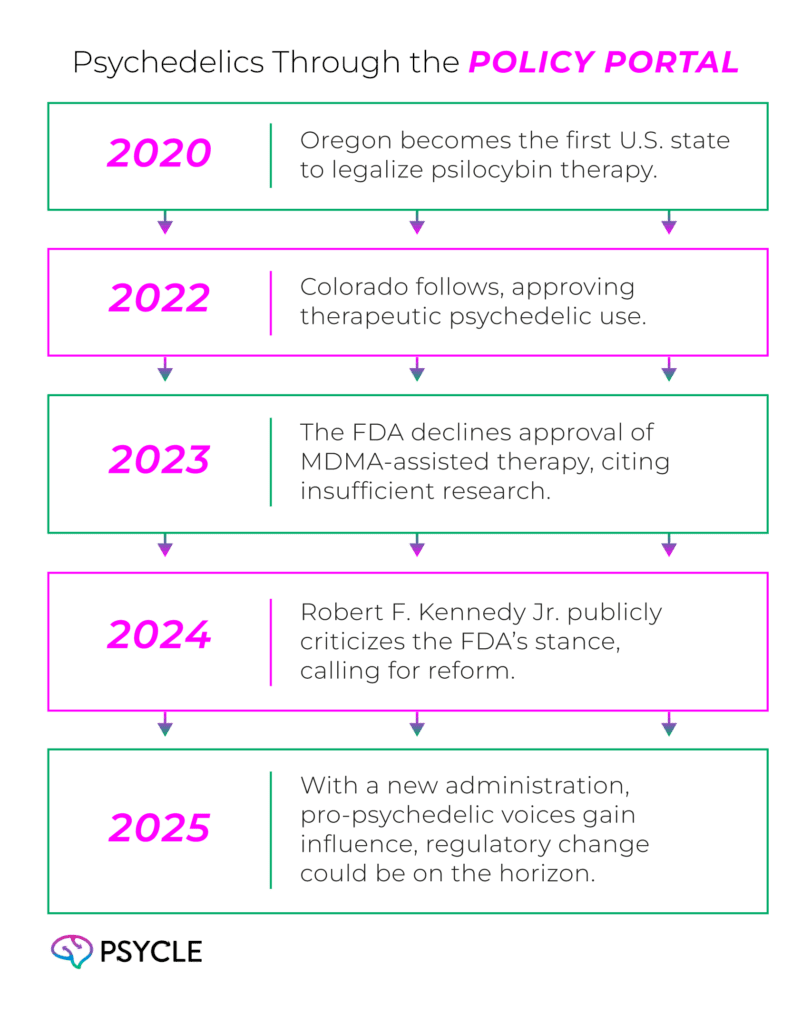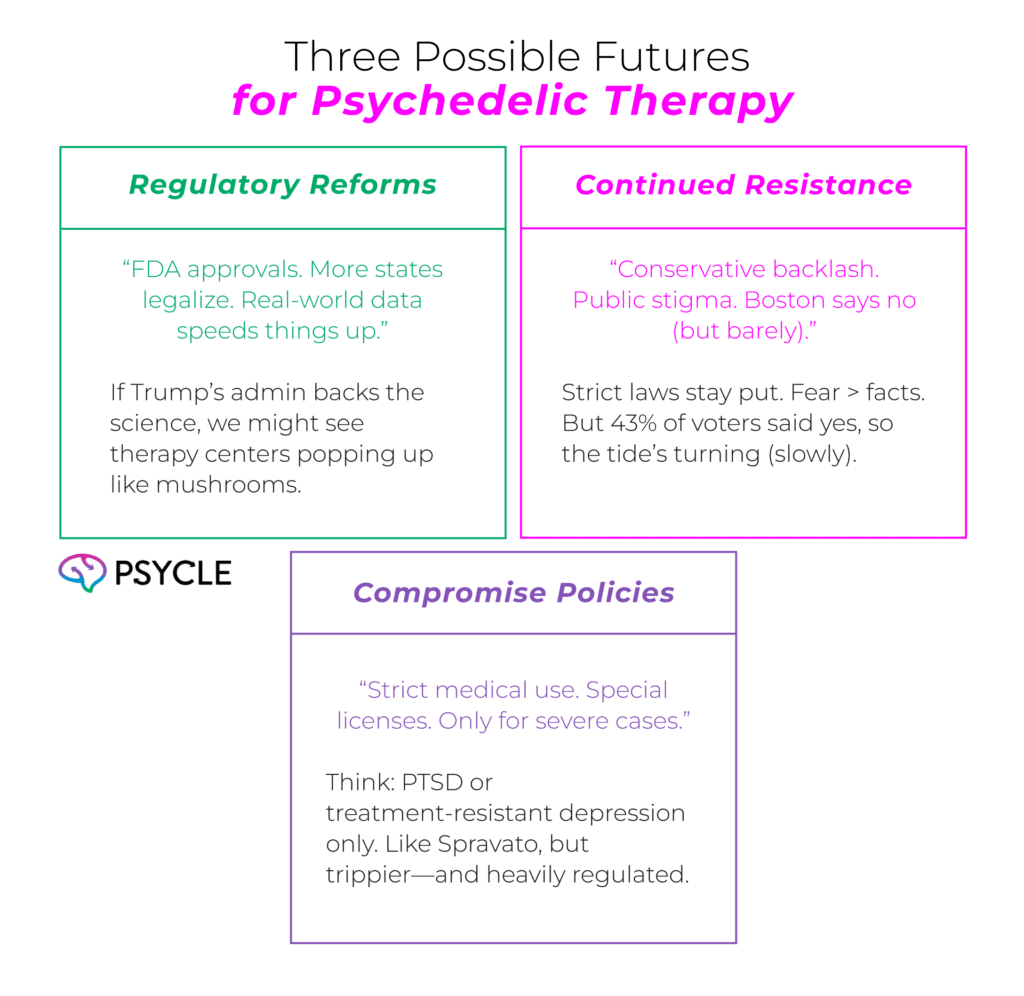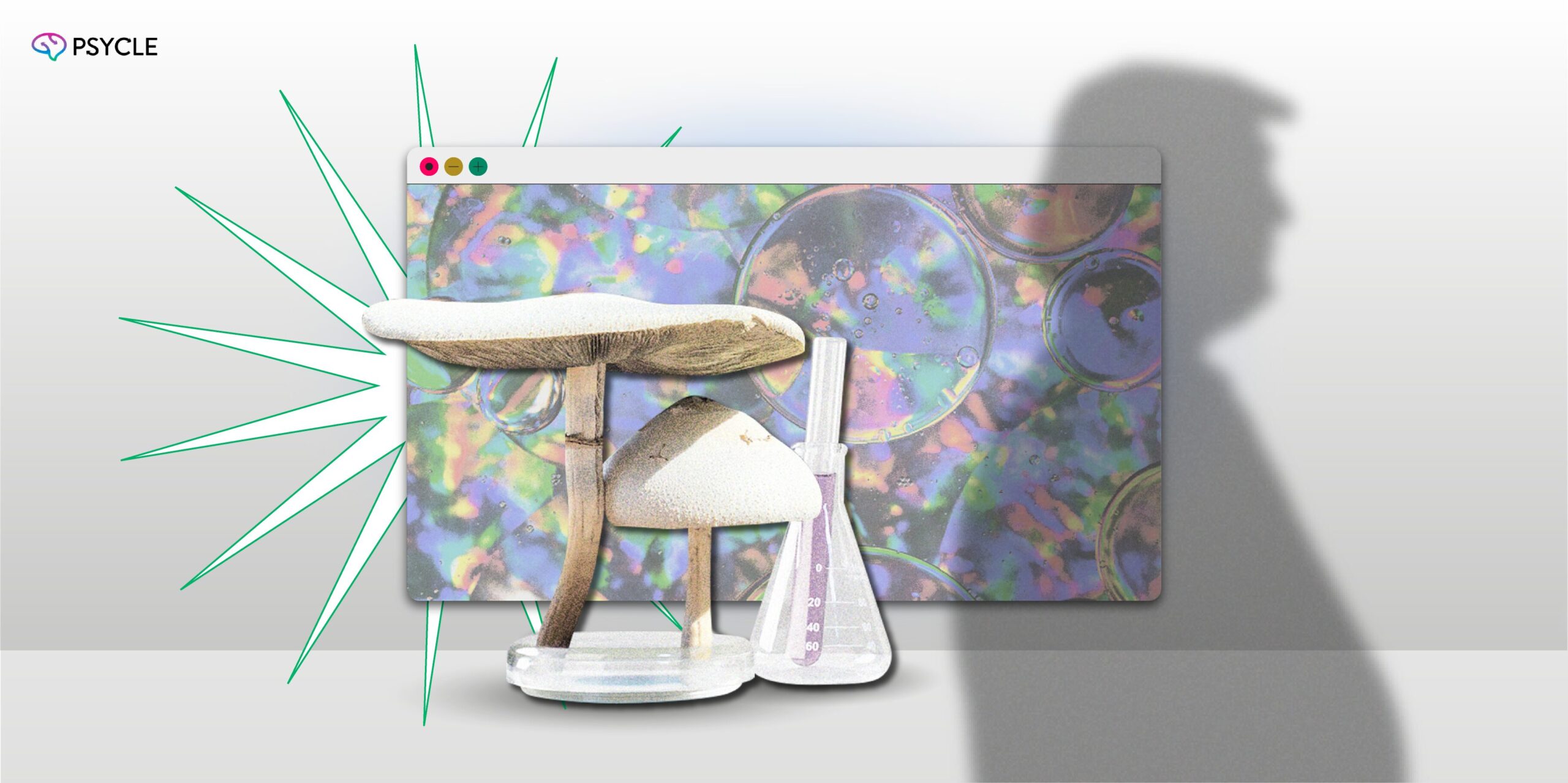Psychedelics are having a moment. Once dismissed as dangerous and illegal, substances like psilocybin and MDMA are now at the center of a growing mental health revolution. Psychedelics are currently prohibited Schedule 1 compounds in America, but it’s possible they could become legally available for medical use now that Donald Trump is back in the White House.
The Psychedelic Renaissance
There has been a surge in research into the therapeutic potential of psychedelic drugs, such as psilocybin (found in magic mushrooms), MDMA, and LSD. Large-scale clinical trials show these substances can profoundly benefit people with depression, post-traumatic stress disorder (PTSD), addiction, and more. With this growing research, governments across the globe have begun to reconsider their laws surrounding psychedelics.
So far, Australia is the only country to have fully legalized the medical use of psychedelics nationwide. However, special access to prescriptions are available in certain other countries, including Canada and Switzerland.

In the US, psychedelics remain Schedule 1 compounds, meaning they’re deemed to be harmful and have no medical value. Yet this scheduling is heavily criticized, and many advocacy groups and initiatives are pushing for change. In recent years, various states and cities have decriminalized psychedelic use, meaning people caught in possession of psychedelics are unlikely to be charged. Oregon also became the first US state to legalize the therapeutic use of psilocybin in 2020, followed by Colorado in 2022.
Last year, the US Food and Drug Administration (FDA) rejected the approval of MDMA-assisted therapy, stating that the research just wasn’t strong enough. This was a huge blow for advocates who had been working tirelessly to bring these treatments into the mainstream. However, with Donald Trump returning to the White House, things could take an unexpected turn.
Trump’s Association with Psychedelic Advocates
Robert F. Kennedy Jr. as Health Secretary
One of Trump’s most attention-grabbing appointments is Robert F. Kennedy Jr. as U.S. Health Secretary. Kennedy has been a vocal supporter of psychedelic therapy, seeing it as a game-changer for mental health. He even went on X (formerly Twitter) to call out the FDA’s opposition to psychedelics as part of a broader “war on public health.” His commitment to reversing these regulatory decisions could be a huge deal for the future of psychedelic medicine in the U.S.
FDA’s war on public health is about to end. This includes its aggressive suppression of psychedelics, peptides, stem cells, raw milk, hyperbaric therapies, chelating compounds, ivermectin, hydroxychloroquine, vitamins, clean foods, sunshine, exercise, nutraceuticals and anything…
— Robert F. Kennedy Jr (@RobertKennedyJr) October 25, 2024
Elon Musk
Trump has called Elon Musk, the CEO of Tesla, his “first buddy,” and has given him office space in the White House complex. Their close friendship has sparked speculation about whether Musk will have an influence on policy decisions over the next year. Musk has been public about his support for psychedelics, having spoken out about his own use of LSD and psilocybin.
In a post on X, he wrote, “I’ve talked to many more people who were helped by psychedelics & ketamine than SSRIs & amphetamines.” Musk is also a big advocate for ketamine, which is considered a non-classic psychedelic, and uses ketamine microdoses to help manage his depression.
I’ve talked to many more people who were helped by psychedelics & ketamine than SSRIs & amphetamines
— Elon Musk (@elonmusk) April 30, 2022
Peter Thiel’s Investment in Psychedelics
Another prominent figure in Trump’s circle is billionaire venture capitalist Peter Thiel. The former PayPal CEO has been a longtime supporter of Trump and invested in his 2016 presidential campaign. Thiel is also a key player in the psychedelic industry, holding major investments in Atai Life Sciences, a biopharmaceutical company developing psychedelic-based therapies, as well as the UK-based research organization Beckley.
In addition, Thiel played a significant role in supporting Vice President-elect JD Vance, further strengthening his influence in the administration.
Trump’s Own Stance on Psychedelics
But what about Trump himself? Unlike some of his advisors and allies, Trump hasn’t made any bold statements on psychedelics. In a conversation with Lex Friedman, he chuckled at the suggestion that Congress should try psilocybin but didn’t give a direct response.
Trump did, however, acknowledge the medical benefits of cannabis on the podcast episode, though he expressed concerns about regulation. This suggests that while Trump might not be outright opposed to psychedelic therapy, he’s also unlikely to champion it unless he sees a political advantage.
@breakthepsycle_ When do you guys think psych*delics will become legal? #mentalhealth #psychedelicresearch #psychedelictherapy #trumpadministration
♬ Black Lambo (Instrumental) – The808Wizrd
Potential Scenarios Under Trump’s Presidency

Regulatory Reforms Favoring Psychedelics
If Trump’s administration embraces the growing body of research supporting psychedelic-assisted therapy, we could see fast-tracked FDA approvals for psychedelic drugs in therapy.
Two U.S. states have already made psychedelic therapy legal, and once those programs are fully up and running, they could provide even more proof that a regulated system works.
Continued Political Resistance
Despite scientific advancements, a more conservative or law-and-order-focused administration could maintain strict regulations on psychedelics. Concerns over public safety, potential misuse, and backlash from traditional Republican lawmakers and anti-drug advocacy groups could stall legalization efforts.
In Boston, a recent bill to regulate psychedelics was rejected, highlighting the public stigma that still prevails around these drugs. Nonetheless, the voting was very close, with 43% of voters in favor of legal psychedelic therapies.
Compromise Policies
A middle-ground approach could involve limited legalization for medical use under strict regulatory frameworks. Psychedelic-assisted therapy might be approved for specific conditions, such as PTSD in veterans or treatment-resistant depression. Like Spravato, providers will likely need special licenses to administer psychedelics, and treatment only takes place in specially-certified centers.
Conclusion
The future of psychedelics under Trump’s presidency is anything but certain, but there are a few things we know for sure. With close alignment to psychedelic advocates, there’s a real possibility that we’ll see policy shifts in favor of research and therapeutic access. At the same time, resistance from conservative lawmakers and Trump’s own ambivalence on the issue could slow things down. Either way, psychedelics are firmly in the conversation, and the coming years could be pivotal for their future in the U.S.

